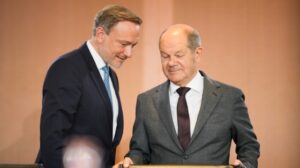A governmental crisis erupted tonight in Berlin, as German Chancellor Olaf Scholz dismissed the head of the Free Democratic Party (FDP) and Finance Minister Christian Lindner—an outcome that had long been anticipated due to conflicts among the coalition partners.
Earlier, Lindner had proposed to Scholz that early elections be held in early 2025, a suggestion the Chancellor rejected. The FDP leader reportedly argued that there was no longer common ground among the coalition partners to achieve meaningful economic recovery.
In a statement at the Chancellery, Scholz blamed Lindner (FDP) for the coalition’s difficulties. Scholz stated that Lindner frequently blocked legislative proposals, even accusing his coalition partner of harming the country.
Following this, the FDP withdrew from the three-party coalition, effectively dissolving it, and pulled its ministers from Scholz’s cabinet—Education Minister Bettina Stark-Watzinger, Transport Minister Volker Wissing, and Justice Minister Marco Buschmann. “The traffic lights go out,” Bild reported, referring to the coalition parties’ colors, which match those of a traffic light.
With the FDP out of government, swift developments are anticipated in Germany. Later on Wednesday, the SPD’s parliamentary group is scheduled to meet.
ARD reported late Tuesday that Scholz would seek a confidence vote on January 15, which could trigger early elections as soon as March, instead of in the fall when the government’s term is set to end.
According to Bild, Scholz “beat Lindner to the punch,” as the FDP leader had planned to leave tonight’s government meeting at the Chancellery, formally end the coalition agreement with the SPD and the Greens the next day, and then withdraw his ministers. “Everything was prepared,” the newspaper noted.
Earlier in the day, the cabinet had convened, while Berlin was buzzing with rumors and speculation about the coalition’s future. By the afternoon, during a meeting among the three leaders (Scholz, Habeck, and Lindner), it became clear they were headed toward an impasse.
The coalition’s discord was fueled by a policy statement from Lindner, in which he laid out demands for measures aimed at “economic recovery” and called for a near-complete overhaul of the government’s economic strategy. Among other things, he demanded the immediate suspension of the climate policy, hinting that FDP’s continued presence in the government depended on his proposals being accepted.
Much of Lindner’s statement was deemed completely unacceptable to his coalition partners and was largely rejected by the SPD and the Greens.
German media described the meeting as critical for the future of the governing coalition (SPD, Greens, and FDP) in Germany, as disputes among the partners and their inability to agree on fundamental issues, such as the 2025 budget, have dangerously escalated.
Ask me anything
Explore related questions





